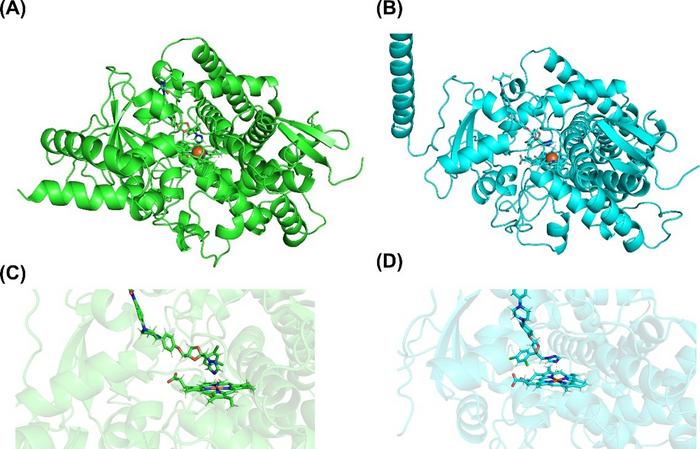Mycetoma is a debilitating disease that predominantly affects individuals in tropical and subtropical regions, particularly within marginalized communities that lack access to comprehensive healthcare systems. This chronic infection manifests through painful swellings, skin nodules, and discharging sinuses, rendering it a significant public health concern. The most common causative agents of the fungal variant of mycetoma, termed eumycetoma, belong to the genus Madurella, including the species Madurella mycetomatis and the lesser-known Madurella fahalii. Despite the grave implications of this disease, mycetoma has historically been neglected by the global medical research community, leading to inadequate diagnostic methods and treatment options that remain subpar.
Physicians have long relied on itraconazole, a potent antifungal medication, to combat M. mycetomatis-caused eumycetoma, which notably targets cytochrome P450 14-α sterol demethylase (CYP51)—a critical enzyme in the fungal sterol biosynthetic pathway. However, resistance among cases caused by M. fahalii poses substantial challenges, as clinical observations have revealed recurrent failure of itraconazole against this species. Until recently, the underlying mechanisms that contribute to this antifungal resistance remained elusive, hindering effective treatment for afflicted patients.
As the understanding of M. fahalii resistance began to surface, a dedicated research team led by Associate Professor Takashi Yaguchi from Chiba University’s Medical Mycology Research Center initiated a comprehensive investigation into the molecular underpinnings of itraconazole resistance in this particular fungal strain. Their groundbreaking study, published on March 27, 2025, in PLOS Neglected Tropical Diseases, employed cutting-edge genomic technologies and biomolecular chemistry to elucidate the specific factors that render M. fahalii less susceptible to the antifungal treatment compared to its more treatable relatives.
Employing advanced sequencing techniques, researchers discovered a significant genomic divergence between M. fahalii and M. mycetomatis. Of particular interest was the identification of an additional gene in M. fahalii encoding a variant of the CYP51 enzyme, designated as Mfcyp51A2. Importantly, this gene was not present in the genome of M. mycetomatis, which harbored only a single CYP51 variant referred to as Mfcyp51A1. The structural and functional discrepancies between these two gene products provide insight into the mechanisms of drug resistance, with Mfcyp51A2 acting as a formidable line of defense against itraconazole’s inhibitory effects.
In an experimental setup designed to assess enzyme activity, researchers found that both Mfcyp51A1 and Mfcyp51A2 demonstrated enhanced expression upon exposure to itraconazole. However, the Mfcyp51A2 variant exhibited an even more considerable increase in activity, showcasing a quintessential defensive response to the antifungal treatment. The surgical transplantation of these CYP51 genes into yeast models further substantiated their findings, demonstrating that yeast cells containing the Mfcyp51A2 variant were significantly less affected by itraconazole than those with the standard Mfcyp51A1 allele.
Moreover, computational molecular dynamics simulations elucidated the differential binding affinity of itraconazole to both enzyme variants. It was revealed that while the antifungal agent could interact with both Mfcyp51A1 and Mfcyp51A2, its binding to the Mfcyp51A2 variant was notably weaker, effectively diminishing the drug’s efficacy against M. fahalii infections. This critical insight sheds light on the biochemical nuances underpinning the drug resistance phenomenon observed clinically.
The implications of these findings are profound. This study marks a pioneering exploration of the physiological characteristics of Madurella species through the lens of genetic engineering, significantly advancing the understanding of antifungal resistance mechanisms in neglected pathogens. Dr. Yaguchi emphasized the transformative potential of molecular techniques in illuminating previously obscured biological processes and fostering technological innovations to combat disease resistance.
By deciphering the molecular intricacies of drug resistance, researchers lay the groundwork for the development of more effective therapeutic strategies against eumycetoma, which could positively impact the lives of countless patients who endure this condition. The overarching goal remains to translate these insights into practical applications that facilitate timely and effective treatments, ultimately improving health outcomes in impoverished populations.
As the research team continues their vital work, there exists an optimistic prospect for the future of mycetoma treatment. The collaborative efforts among global scientists aim to tackle the obstacles presented by M. fahalii resistance, fostering hope that novel interventions may soon emerge. Each step in this ongoing journey reinforces the significance of basic research in addressing real-world healthcare challenges, amplifying the importance of dedicated scientific inquiry.
In conclusion, the advances made in understanding itraconazole resistance in M. fahalii provoke a renewed focus on neglected diseases. By bridging the gap between foundational science and clinical application, researchers can pioneer pathways toward novel antifungal treatments tailored to combat resistant strains. As this field of study evolves, it embodies the essence of transformative research aimed at alleviating human suffering.
The concerted efforts of dedicated scientists like Associate Professor Takashi Yaguchi epitomize hope for the future—a future where targeted therapies and better healthcare access can provide meaningful relief to those disproportionately affected by diseases like mycetoma.
Subject of Research: Cells
Article Title: Itraconazole resistance in Madurella fahalii linked to a distinct homolog of the gene encoding cytochrome P450 14-α sterol demethylase (CYP51)
News Publication Date: 27-Mar-2025
Web References: PLOS Neglected Tropical Diseases
References: N/A
Image Credits: Associate Professor Takashi Yaguchi from Chiba University, Japan
Keywords
Mycetoma, eumycetoma, antifungal resistance, itraconazole, cytochrome P450, genetic engineering, molecular mechanisms, neglected tropical diseases, *Madurella fahalii*.




